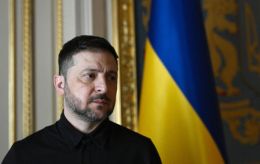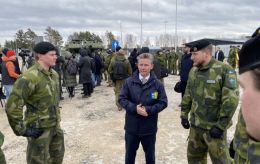Not a step without 'ausweis': How Kremlin forces Ukrainians under occupation to take Russian passports
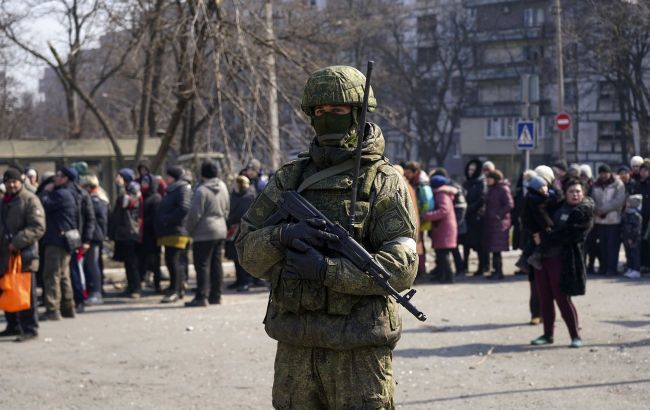 A Russian soldier in Mariupol (photo: Getty Images)
A Russian soldier in Mariupol (photo: Getty Images)
Ukrainians under occupation without a Russian passport will be considered foreign citizens by Russia starting in 2025. RBC-Ukraine explains how Russian invaders are forcing people to apply for Russian documents, why it has become a matter of survival, and how Ukraine is reacting.
Contents
- No alternative citizenship
- How Russia blocks air for Ukrainians under occupation
- Ukrainian government's response to Russia's forced mobilization
The Russian occupation has never been aimed exclusively at holding territories by force. Its purpose is the colonization of the seized lands and their further integration into the Russian world. For this purpose, the Kremlin uses a wide range of tools, including hundreds of processes ranging from violence to propaganda.
One of the most powerful tools of Russian colonial policy is passportization. By forcing people to take the documents of the occupying power, Russia thus links them to its system, forcing them to swear allegiance to Moscow. The expectation is that a person who has been living under Russian occupation for a long time will sooner or later come to terms with this fact and begin to identify himself as a Russian citizen.
Russia began to impose its passports almost immediately, simplifying the scheme for obtaining them to a few steps. Initially, residents of the occupied regions could do without Russian documents by looking for various loopholes and white spots. But the Kremlin has been closing loopholes and highlighting white spots step by step, leaving people with no choice: either you take a Russian passport or your life at home becomes unbearable.
No alternative citizenship
“As early as 2014, Ukrainians under occupation began calling Russian passports so-called Ausweis. And I think this is an understandable parallel. People don't perceive it as a passport,” Olena Luniova, advocacy director of the Zmina Human Rights Center, tells RBC-Ukraine.
During the Second World War, German troops, having captured Ukraine, after a while, began to demand that residents issue Ausweis - identity documents. According to thousands of testimonies, it was difficult to live without an Ausweis during the occupation, and they were asked for it at every turn. The Ausweis was not a German passport, and the Germans did not try to force Ukrainians to become German citizens. The Russians, on the other hand, when they hand out their Ausweis, are aiming for this very purpose: to get new Russian citizens.
Russia, as an expansionist state, immediately after the collapse of the USSR, prepared its laws to support the colonization of other countries. For example, thanks to various loopholes, the Kremlin could easily passport citizens who gained independence in 1991, and 2007, a Russian court extended the validity of Soviet passports forever.
Residents of former Soviet republics received privileges if they swore allegiance to Russia. Russian laws also have a category of native Russian speakers. Back in 2006, the program of resettlement of compatriots was launched, and in 2020, despite the resistance of both the Ukrainian authorities and the international community, Ukraine, Belarus, Kazakhstan, and Moldova were included in the list of so-called privileged countries that can obtain Russian citizenship and permission to stay in Russia under a simplified procedure.
Moscow is trying to present this whole simplification construct as a union gesture - a hand of friendship and mutual assistance extended to its so-called brothers, to recall the glorious days of the Soviet Union when all fifteen republics lived as so-called one big friendly family. This policy has nothing to do with friendship or alliance; it is only beneficial to the Kremlin, as it simplifies the future integration of the seized regions into the Russian space.
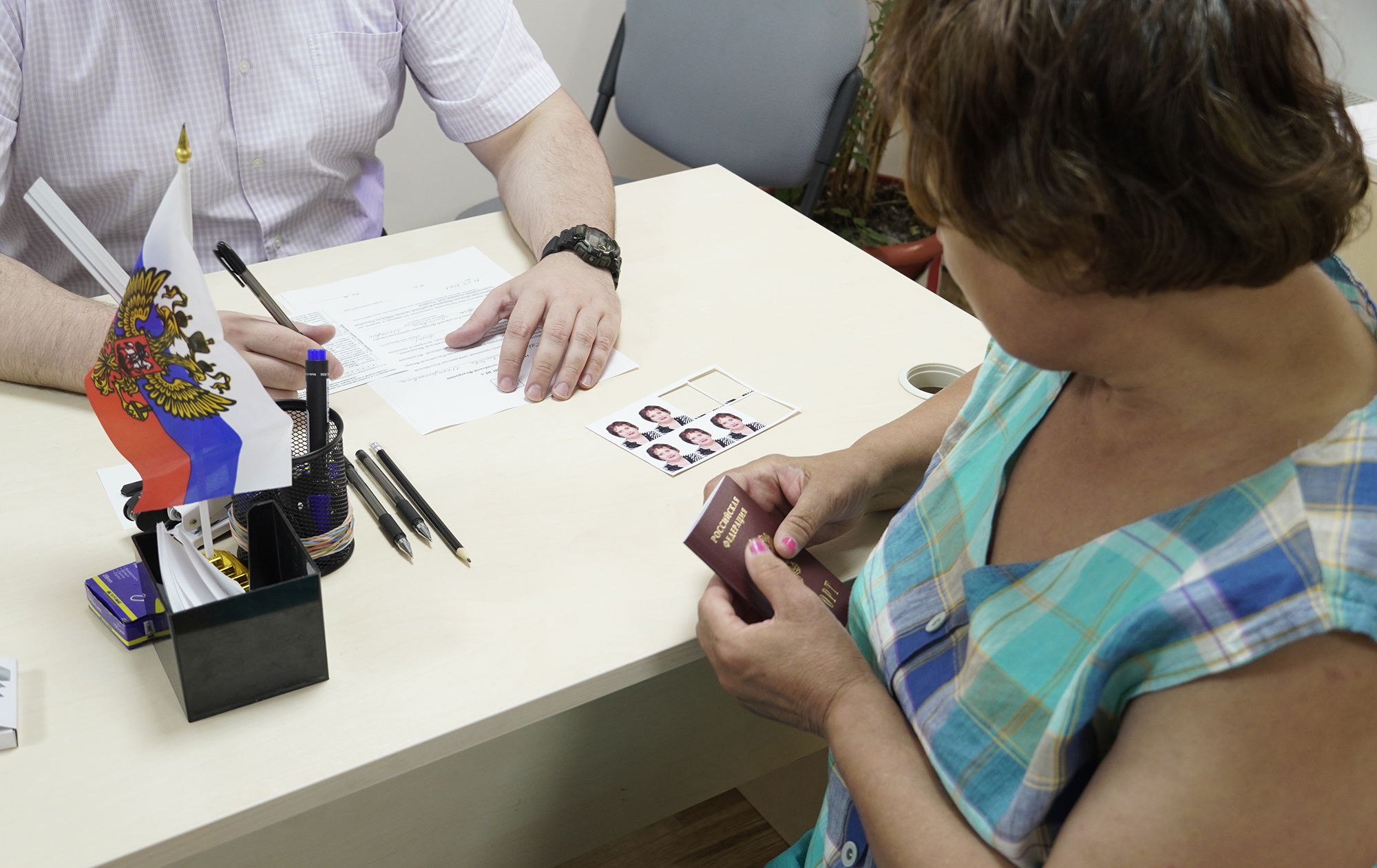 The process of obtaining a passport (photo: Getty Images)
The process of obtaining a passport (photo: Getty Images)
Russia has also prepared for the seizure of foreign territories: back in 2001, Russian legislation prescribed the procedure for accession of other states to Russia. This is where the so-called referendums that were later held in the occupied territories of Ukraine came from. For people living in these territories, Russian laws kindly offer a so-called option - the possibility of choosing citizenship. However, Russian legislation is quite flexible and can change depending on the wishes of the Kremlin leadership.
In September 2022, after the so-called referendums held in the occupied regions of Ukraine, all residents were called upon to swear allegiance to Russia by obtaining Russian citizenship. Initially, people retained the formal right to hold a Ukrainian passport and not exchange it for a Russian one. It was enough to issue a residence permit, but it was virtually impossible to obtain this document.
For example, in Kherson, out of 19 passport issuance centers, there was only one issuing a residence permit. To get this piece of paper, a person needs to collect a huge package of documents, and this is unrealistic, given the fact that the Russian army, when capturing a settlement, literally wipes it out with all the houses, apartments, and documents stored there.
On the other hand, Russian laws are quite cunning in setting out the conditions for obtaining a permanent residence permit. For example, a person cannot obtain a residence permit if he or she is engaged in so-called extremist activities, and this concept in Russia is truly unlimited. The status of an extremist can be obtained for anything - from a yellow and blue ribbon on your clothes to empty posters. It all boils down to the fact that Ukrainians under occupation are left with no choice - Russian citizenship is imposed on them as the only way to stay at home in Ukraine.
How Russia blocks air for Ukrainians under occupation
The procedure for imposing passports in the occupied Crimea and Donetsk, Luhansk, and later Zaporizhzhia and Kherson regions is different. A so-called referendum was immediately held on the occupied peninsula, automatically enrolling Crimeans as Russian citizens. To appear loyal, the Russians announced that it was possible to renounce citizenship, but they gave 18 days to do so and made the procedure as complicated as possible. As a result, out of the 3.2 million people living in Crimea, only a little over 3,000 managed to give up their Russian passports.
In the Donetsk and Luhansk regions, until 2021, Russian passports were one of the options, but they were not mandatory documents. Instead, people were actively forced to obtain documents of the so-called young republics, turning them into citizens of non-existent states. In 2021, passportization became more aggressive - people were frightened that without Russian passports, they could not access many services and social guarantees.
Apparently, by this time, the Kremlin had already decided that it would launch a large-scale war against Ukraine, and for this, it needed a mobilization resource - it was decided to take it from the occupied Donetsk and Luhansk regions in the best traditions of colonial policy. However, when Russia realized that the existing mobilization resource would not be enough, residents of the occupied territories began to be taken to the front regardless of their passports.
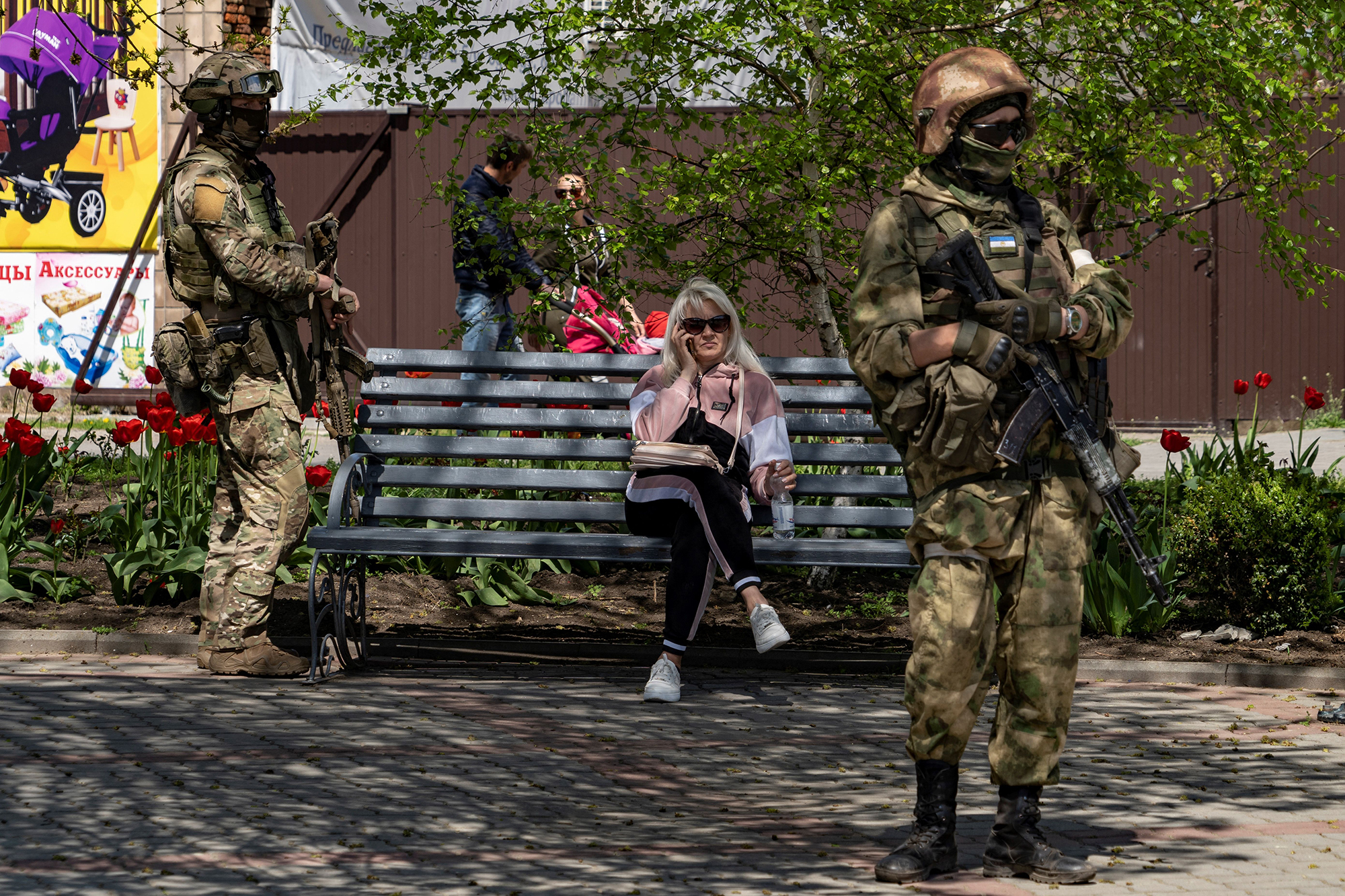 Russian occupiers in Berdiansk (Photo: Getty Images)
Russian occupiers in Berdiansk (Photo: Getty Images)
Before Russia invaded Ukraine, this issue was handled by Vladislav Surkov, a former deputy prime minister of Russia and a well-known ideologist of the integration of Ukrainian territories into Russian space. He was later replaced by Sergey Kirienko. Today, he actively travels to the regions captured by the Russian army and checks the so-called quality of work.
In April 2023, six months after the so-called referendums, Vladimir Putin signed a decree according to which residents of the occupied regions who refused to give up their Russian passports would be able to stay in these territories only until July 1, 2024, after which, according to Russian law, they would be called foreigners and subject to deportation. Later, when the Kremlin realized they were not satisfied with the pace of passportization, the deportation day was postponed to December 31, 2024. And they started implementing more radical measures.
It all started with state employees - doctors, teachers, housing and communal services and municipal workers created conditions where they could no longer receive their salaries without a Russian passport. For example, in Snizhne (Donetsk region), ten doctors were fired for working without Russian passports. They brought doctors from Samara to replace them.
Then, Russians started with entrepreneurs - they were obliged to re-register their businesses based on Russian passports. In addition, company directors are required to report to the so-called local authorities how many people in their company have not received Russian occupation documents. In Horlivka, businesses were ordered to send lists of those who had not received a Russian passport to the so-called Donetsk People's Republic Ministry of State Security by January 1, 2024.
Then, the Russian troops banned paying pensions to people without Russian documents. A school graduate will not receive a certificate of secondary education unless he or she provides a Russian passport. The loopholes are getting narrower and narrower - now, a person will be denied medical services if they do not have an insurance policy that requires a Russian passport, cannot issue a bank card, cannot enroll a child in a kindergarten, or cannot get a job. Gradually, residents of the occupied territory have become so limited in their options that obtaining a passport has become a matter of survival, says Ivan Fedorov, head of the Zaporizhzhia Regional Military Administration.
“We have to admit that, unfortunately, today, it is impossible to live in the temporarily occupied territory without a Russian passport. Over the past two and a half years, there have been about five waves, and this is how Russia forced Ukrainian residents to get Russian passports. At first, it was a demonstrative propaganda story, when Ukrainians were forced to take Russian passports right on camera. And then Russia began to clamp down on people and make it impossible for them to stay at home,” Fedorov says in a comment to RBC-Ukraine.
The latest so-called innovations of the Russian occupation authorities at the behest of the Kremlin put an end to the question of whether the coercion of Russian citizenship can be ignored. Some time ago, it was reported that the Russian occupiers were forcing people to re-register their housing following Russian law. To do this, you need a passport, as stated by the Ukrainian Parliament Commissioner for Human Rights, Dmytro Lubinets.
“According to the so-called new laws, the owners of property located in the temporarily occupied territories have 30 days to personally appear at the local government and claim their rights to the property. The owner must provide an identity document, in particular, a passport of a citizen of Russia,” Lubinets says in a comment to RBC-Ukraine.
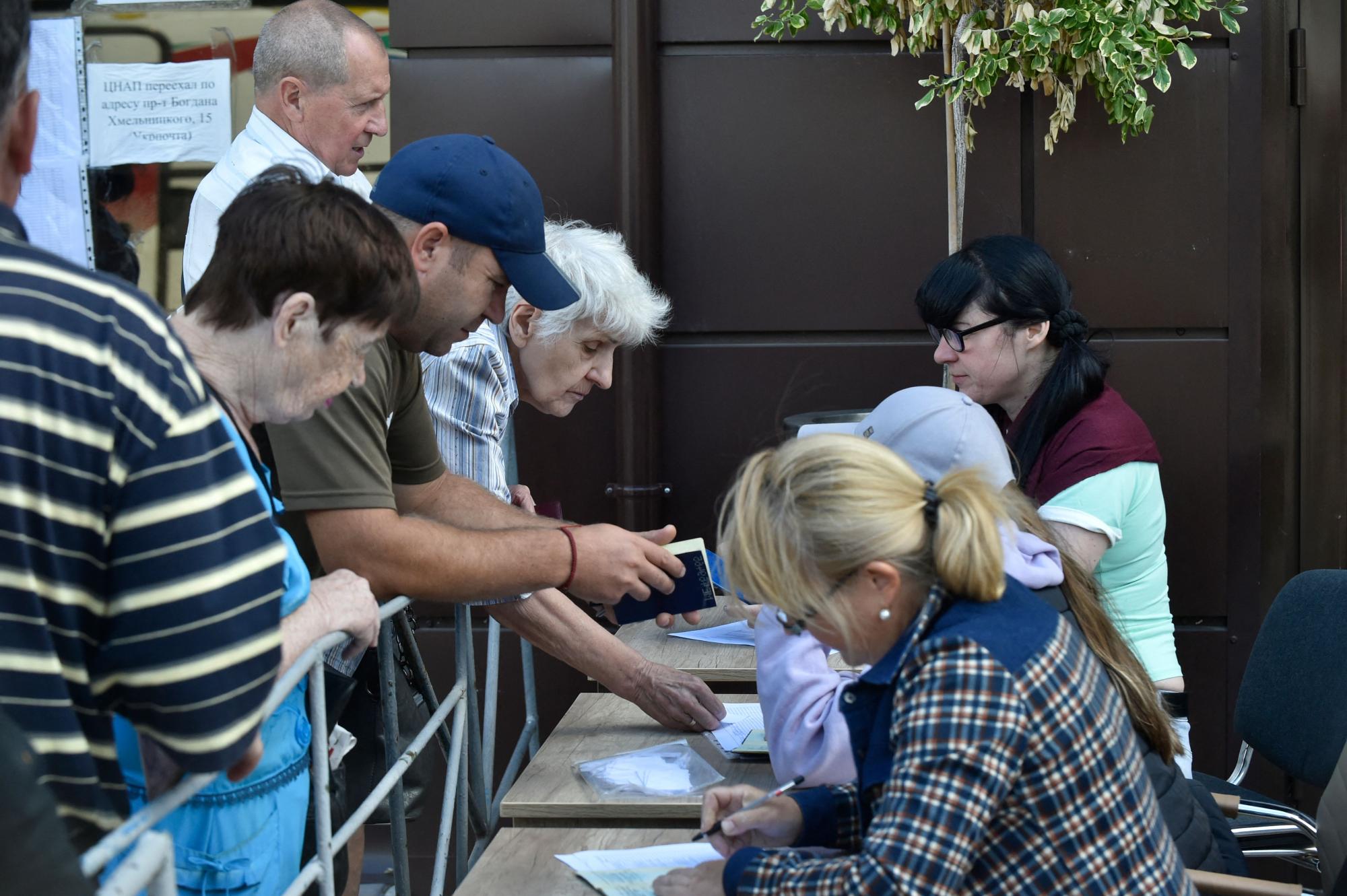 Residents of the occupied territories are forced to obtain Russian passports (photo: Getty Images)
Residents of the occupied territories are forced to obtain Russian passports (photo: Getty Images)
If the property is not registered in the Russian system within 30 days, it is officially considered ownerless according to Russian law, which means that the Russian occupiers can expel a person from their apartment and nationalize it. Later, it will pass into the hands of municipalities, and then it will either be sold to a Russian who decides to move to the imaginary Mariupol closer to the sea or given to Russian soldiers or the FSB.
“There is someone to move into this housing because many things have been destroyed. Instead of building something new and moving people in, it's much easier to illegally expropriate residential real estate under the pretext that its owners have not received Russian passports or have not registered their property. We see that Russia is doing everything possible to ensure that people in the occupied territory receive passports,” Luniova says.
Many of those who left their homes in the Russian occupation and moved to the Ukrainian government-controlled territory had to return and re-register their documents in order not to lose their property. Moreover, many people hoped to find out the situation at home and do so without applying for Russian citizenship, but they were faced with another so-called innovation from Moscow - they were not allowed back without a Russian passport.
On the contrary, people who are still trying to be invisible to the system are beginning to arouse additional interest and suspicion among the Russian occupation authorities. “If you don't have a Russian passport, when you are checked on the street, you can be sent to the commandant's office for a preventive conversation. They can do that for sure, and that's what they do,” says Fedorov.
The Russian occupiers will be interested in knowing about the motivation of a person who has not yet taken a passport. Obviously, they will be checked for loyalty to Ukraine, and here, everything is the same as in the issue of extremism - the FSB has unlimited possibilities.
In addition to the obvious imposition and coercion, the Russian passport creates several other problems, especially for men. One of them is mobilization. Russia pretends that the occupied territories are part of Russia, where people who have sworn allegiance to it live. Therefore, it reserves the full right to conscript Ukrainians into its army. At the same time, for each such action, the Russian legislation prescribes a separate regulation, a source in the special services tells RBC-Ukraine.
“Interestingly, they do everything according to the law. They are very law-abiding in this regard. If you want, you can find everything in their regulatory framework on websites with decrees, the constitution, etc. Up to the migration centers they are actively building in the occupied territories,” the source says.
The so-called transitional period in the occupation ends in December 2024. From the beginning of 2025, Ukrainians who have not received Russian citizenship are considered foreigners and are subject to deportation. For this purpose, temporary detention centers for foreign citizens will be set up in the occupied regions, as confirmed by Lubinets.
“There are reports that the Russian authorities are allegedly planning to set up special camps for such persons, where they will be held as foreigners. This information is disturbing and emphasizes the intensification of repressive measures against the population of the temporarily occupied territories, but there are few concrete confirmed details about these camps,” Lubinets says.
Many Ukrainians were held in such centers when they were forcibly deported to Russia, but how they will look and function under occupation, where those Ukrainians who refused to obtain a Russian passport will be deported, are still unanswered questions.
Ukrainian government's response to Russia's forced mobilization
“The government has no idea what to do with people who take Russian passports while under Russian occupation. And some of the structures that are supposed to deal with these processes contradict each other,” says a source in the special services.
Almost from the very beginning of the forced passportization, the Ukrainian government did not have a single position on the fact that a person under occupation takes a Russian passport. One thing is certain: this is not a criminal offense and will not be prosecuted. And then opinions begin to diverge. For example, Ombudsman Lubinets periodically states that Ukrainians are not responsible for what the Russian occupiers forced them to do.
“Citizens of Ukraine who received Russian passports under pressure from the Russian occupation authorities retain the status of citizens of Ukraine and will not be held accountable for this upon their return to the Ukrainian-controlled territory,” he insists.
At the same time, his colleague, Deputy Prime Minister Iryna Vereshchuk, and the Ministry of Reintegration of the TOT under her control occasionally comment on the passport program and do so in rather strange ways. For example, in mid-August, the ministry's Facebook page posted information that Russians were confiscating the property of Ukrainians under Russian occupation if they did not have Russian passports. The Ministry criticized the actions of the Russian invaders but immediately made it clear that the so-called nationalization of housing would not be an excuse for obtaining Russian documents.
“We remind you that obtaining a Russian passport for the TOT is justified only if a person is trying to travel to the territory controlled by the government of Ukraine or third countries using this document,” the Ministry says.
RBC-Ukraine asked the Ministry for comment, but at the time of publication of the article, the Ministry did not respond to the request. The government has not yet come to a consensus on what to do and what position to take regarding people who were forced to obtain Russian passports.
“Russia is creating conditions for as many people as possible to become infected with the Russian world. If we play by these rules, follow this logic, and perceive our citizen who has taken a Russian passport as infected, it means that Russia is winning,” says Olena Luniova.
